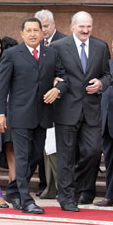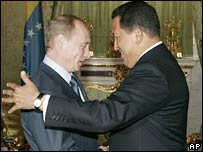Tic tac tic tac tic tac…Luis Alcalá was leaving his house to go pick up his eight year old kid from school. The man he’d seen scoping out his home several times in the last few days walked up to him, pulled out a 9 mm, shot him twice, and ran off. Two days ago, Luis Alcalá became the first victim of a targeted political assassination in Chávez era Venezuela.
Alcalá had been working with Army lieutenant colonel (ret.) Hidalgo Valero, at an antichavista NGO called Popular Defenders of the New Democracy. Valero announced that Alcalá had been investigating the financing of the
Circulos Bolivarianos, chavista neighborhood groups that are widely seen as fronts for a paramilitary organization. Alcalá had received two death threats in the last few weeks. Lots of antichavista activists have. Two days ago, for the first time, they made good on those threats.
It’s hard to know what to do with the sinking sensation in the pit of my stomach as I write these lines. On the “you are here” map of political conflict, we are now where Colombia was in 1948, where El Salvador was in the mid-70s. You can see it starting to happen, you can actually see the polarization turning to threats and intimidation, and the intimidation turning to violence. But you can’t stop it. And you have no idea how far it will go, when it will stop, or when it’ll catch up with you, or your family.
Alcalá’s funeral was held yesterday. In a totally baffling decision, the chavista chief justice of the Supreme Tribunal, Iván Rincón, decided to attend. He was almost lynched by the mourners. They had to carry him off in the middle of a melée as people swung fists his way, hurling insults at him for protecting Chávez. At one point, before it got really bad, one of Alcalá’s relatives fell to her knees in front of him, crying and imploring him to
do something to stop the spiral of violence.
Meanwhile, in Mérida (about 500 kilometers southwest of here), Monsignor Baltasar Porras, the head of the Catholic Bishops’ Conference, had a similar experience when he turned up to an event dominated by chavismo. The church is seen more and more as an apendage of the opposition, and Monsignor Porras barely managed to get away unscathed.
Last week, a chavista mini-mob went after one of the cars that carries around Globovisión’s crews – that’s the antichavista all-news TV station. One of the best known opposition figures, Henrique Salas Römer was harshly attacked as he tried to lay a floral wreath at Bolívar’s statue in downtown Caracas…some guy walked up behind him and hit him in the head twice, hard, with a rock he was holding. I’ve lost the count of how many opposition figures I’ve heard on the news saying they’re being threatened, imploring the police for protection, begging the government to call of its thugs. Doesn’t seem likely.
This is the nasty, ugly side of the situation here. Except for Alcalá’s murder, you could say it’s relatively minor stuff, more bluster than anything else. But what people are worried about is not so much what’s already happened but rather what seems to be on the verge of happening. There’s this hard-to-describe but unmistakable atmosphere of dread here, this sense that what we’ve seen so far is only the tip of the iceberg. The country hasn’t quite blown up so far, but it’s hard to shake the sense that that could happen any minute now. Luis Alcalá’s murder is a very, very bad sign.
Tic tac tic tac tic tac…
Please comment responsibly:
|
"Please crush our movement, sir."The thing about these "Security Zones" is that by decreeing them, the government set out an implicit dare. "You can`t come here," Chávez said, "off limits!" So, of course, following the 6-year-olds-at-the-playground mentality that dominates opposition strategizing these days, they obviously
had to go and protest inside the security zone, didn't they? It was a dare! What do you think we are, a bunch of sissies?
Not to belittle the issue. The opposition's obviously justified in its anger at the security zones. It's obviously unacceptable for any government to try to tell me where I can and can't hold a political march, much less for this government to do so. But I do mean to point out how sadly predictable and slightly infantile the opposition's tactics are: there's no provocation they won't fall into, no waving red cape they won't charge.
So they went and called their rally. It's happening right now, and it looks like they got the typical, quite solid turnout...100,000 or so, I'd guess. My sisters are there, but I had to deal with a plumbing emergency so I didn't make it. From what's on the TV, it's the usual: standard noisemakers, standard waving Venezuelan flags, standard hysterically overhblown anti-chavista speeches ("This is the WORST, the most CORRUPT, the MOST CRIMINAL government Venezuela has EVER had!!!!"
loud cheers "Mr. President, if you want to live in communism, go move to Cuba like you wanted to on April 11th!!!!"
more loud cheers...and so on...these were thrilling 8 months ago when they were new, but at this point...sigh...]
The funny thing is that the government is normally quite savvy about not picking stupid fights like this one. Don't get me wrong, they pick about every other type of fight imaginable, but this type of fight they usually avoid. They've actually been really liberal about allowing protests and media dissent - though, yes, individual journalists are attacked by little chavista mobs with startling regularity. Still, the newspapers are still running, and absolutely chock-full of harsh antigovernment rhetoric, same for the magazines, radio stations and TV stations, all the media. Though the criticism clearly drives Chávez half insane, the government's been quite skillful about not giving the opposition any martyrs or symbols to rally around, either in terms of censored newspapers, jailed opponents or banned protests.
It's clearly the best way they could deal with it: trying to repress the huge opposition movement would blacken the government's international reputation badly, and it obviously wouldn't work because the opposition is just too large and too determined. Besides, when protest isn't banned, it's ever so much less sexy. Half the point of protesting is the transgressive thrill of challenging authority...witness the beaming pride of anti-globalization protesters everywhere as they're hauled off to jail.
Chávez hasn't fallen for it, which is what makes this latest goof with the security zones so odd. The opposition was obviously thrilled to finally get dared. The government, realizing that the likely, 100,000 strong crowd would be impossible to stop or tear-gas into submission, decided to backtrack. Chavez ordered the defense ministry to issue a permit for the march -- a permit which, incidentally, nobody had asked for.
It was a smart move, and really took the wind out of the sails out of a lot of opposition members. One disgruntled sister called me this morning saying, in a half-joking sort of tone "this damn government! I don't believe this! how dare they give us permission to march? Makes me not even want to go!" I suggested she organize a march to protest the government's decision to allow marches. Very silly, yes. But then farce is what Chávez era Venezuela is all about.
The broader point is that the opposition has an Alex Keaton problem: how do you rebel when you have a hippie dad who lets you do whatever you want? We're desperately itching to rebel, we want to so so much because we find this government so so deeply deplorable. But the more we push, the more the government digs in to its velvet-gloves policy, leaving us in a state of collective frustration.
It's vintage Chávez, come to think of it...guy's so useless he can't even repress our movement properly...
Please comment responsibly:
|
"We've reached the breaking point and nothing is improbable."It's a scary thought. But it's much much scarier as a screaming headline leading the nation's most widely read newspaper. Especially when it's in the mouth not of some pundit, but of a Major General on active duty, one of the top ranked commanders in the armed forces. But Major General Enrique Medina Gómes statement yesterday didn't stop at that: "We're seeing an abuse of power on the part of the government, and if that's the case then there is no rule of law. A lot of people are playing with fire here. But every society has a limit to how much its willing to tolerate, it would seem that an eventuality is on the cusp of taking place."
Yikes.
Statements don't get very much more straight-forward than that.
Medina Gómez' role in the April coup remains unclear. He had been working as Venezuela's military attaché in Washington. Then, just a few days before the coup, he returned to Venezuela. As a barely concealed anti-chavista, it's little wonder that so many rumors and conjectures followed his judiciously timed return. Some people are convinced he served as a sort of secret liaison between the coup-plotters back home and the Pentagon, that when he returned right before the coup he was carrying all manner of military equipment, from weapons to communications encryption gadgets. It may be true, it may be just talk, but Medina Gómez has certainly come to be seen as the stand-in for old style Latin American military conservatism in today's Venezuela. The government must be watching him like a hawk: I doubt if he's uttered a word in the last six months that Military Intelligence and/or DISIP haven't recorded. Even then, lots of people are convinced he's actively working towards a hard-right coup...ahem...a hard-right "eventuality." Right. The right wing fringe sure is starting to see him as its knight in shining armor, a much hoped for Pinochet option. Then again, I bet Pinochet wasn't making bombastic statements to the Chilean press right before he toppled Allende.
Please comment responsibly:
|
Reinventing the hyperinflation wheelProbably the hardest part of my job is writing about monetary and fiscal policy, impossibly technical topics that tend to make readers’ eyes glaze over. Inspired by the great and mighty Paul Krugman, I go to any lengths necessary to try to make these topics easily digestible. Not sure if I always succeed. In any case, today’s post is an attempt to write an interesting (or, at the very least, understandable) critique of the Venezuelan Central Bank’s monetary policy. Let me start with a bit of a story:
In 1941, a British officer by the name of R.A. Radford was captured by the Nazis and confined to a POW camp. At the camp, Radford and 2400 other inmates were forced to live on meager rations delivered by the Red Cross. The rations issued to each prisoner contained a bit of bread, some sugar, biscuits, jam, margarine, tea and chocolate bars, with small rations of canned meat sporadically made available. They also included 25 cigarrettes per prisoner per week. Radford, who had been trained in economics before the war, noticed how even in the extreme conditions of a Nazi prison camp, a rudimentary market system developed as prisoners traded with one another to maximize their satisfaction. The British army's Gurkahs, for instance were eager to trade their meat for other foods, since as Hindus they were strict vegetarians. Prisoners who didn’t smoke were eager to trade their cigarettes for food. At first, each of these trades was a simple barter. But soon enough, the inmates realized the need for a more sophisticated system of exchange. Lacking money, they started using cigarettes as prison currency. A ration of margarine might be bought for seven cigarrettes, which could then be used to buy one and a half chocolate bars, and so on.
Soon after his release, Radford described the system that developed in a classic paper entitled “The Economic Organization of a POW Camp,” a write-up that's much appreciated by undergraduates everywhere for its skill at explaining the mysteries of monetary systems. What interested Radford the most was the way that cigarrettes, as a means of exchange, were subject to all of the fluctuations of normal currency. So long as there was a roughly steady relationship between the number of cigarettes in circulation and the goods those cigarettes could be traded for, “prices” in terms of cigarettes remained more or less stable. But when a shipment of cigarrettes unexpectedly arrived, an inflationary spiral was set in motion. With the camp suddenly awash in “unbacked cigarettes” (additional cigarettes that circulated without a corresponding increase in the amount of other goods they could buy) prisoners would demand more and more of them in exchange for other goods. Alternatively, when cigarettes failed to arrive for one reason or another (an allied bombing raid, for instance,) a liquidity crunch took hold of the camp. These currency shortfalls would actually lead to recessions at the camp: with inmates eager to hang on to their scarce cigarettes, it became more and more difficult to find people to trade with.
If you want to understand why so many Venezuelan economists are alarmed by the Central Bank’s decision to monetize Bs.6.2 trillion worth of “exchange profits”,
go read Radford’s piece. As Venezuelan analysts keep saying, but few people seem to quite grasp, exchange market profits are just unbacked money. The effect of financing a government deficit with unbacked money is just the same as the effect of sending a huge new shipment of cigarettes into Radford’s prison camp. The balance between the money supply and the goods available for purchase goes all out of whack, and prices begin to rise out of control.
“Exchange market profits” is one of those expressions that tends to baffle people. My boss likes to explain it with an example. Imagine you run a company whose only asset is an apartment. The company bought that apartment for $100,000 a few years back. But now, due to inflation, that apartment is worth $120,000. Would you say you’ve made a $20,000 profit? Well, not really. Not unless you’ve actually sold the thing, right? But what if,
before selling the apartment, the company declares a $20,000 dividend and distributes it among its shareholders? Does that seem kosher to you? It's Enron-accounting, isn’t it?
Well, that’s precisely what the Venezuelan Central Bank is doing. Over the years, the Central Bank receives a certain stream of dollars, mostly from oil sales. It books each of those dollars at their bolivar cost at the time they’re bought. A year ago, for instance, they could get a dollar for about Bs.750. Now, that same dollar is worth Bs.1450…so what they’re doing is saying that they’ve made a Bs.700 profit on that dollar, booking it, and sending the profits to its only shareholder: the government. The government takes those bolivars and uses them to cover its budget spending commitments, paying wages, state contractors, past-due bills, etc. In short, they pump the resulting bolivars into the economy. Crucially, they do all of this
before they’ve actually sold that dollar.
And how can they get away with it? Because they’re the central bank, and they get to print the money! Because our hypothetical private company can certainly book that fictitious $20,000 profit, but they can't make that profit materialize out of thin air. But the Central Bank can. It doesn’t matter to them that the profits are purely an accounting fiction because they can just order up a fresh batch of crisp new bolivar bills from the printers to cover their declared “profit.” Devious, huh?
Of course, the Chávez administration has been pumping such funny money into the Venezuelan economy for several years now. What sets this latest initiative apart is the scale of this year’s injection. In the past, the exchange gains injected never exceeded Bs.1.5 trillion. This year, following the Bolívar’s sharp devaluation, the Central Bank’s unrealized exchange profits amount to a whopping Bs.6.2 trillion. Printing that many new bolivars would boost the currency base by an eye-popping 38%. Put another way, for ever 100 cigarettes now circulating in the POW camp, the government wants to pump in another 38. The results can only be a very strong spike in inflation.
It’s difficult to overstate how wrong-headed this policy is. For years, academic economists have been investigating the effects of inflation on economic performance and social well-being and, for once, they agree: not only is economic growth impossible to sustain when inflation is out of control but, crucially, runaway inflation hurts the poor the most, impoverishing them farther and faster than almost any other economic phenomenon.
In fact, the inflationary effects of printing money and the effects of inflation on economic performance and on the poor are so well understood it’s just plain embarrassing that Venezuela is having to rehash this discussion well into the 21st century. The outcome of the policy the Chávez government is hawking was fully clear by the 1920s, when the German economy imploded in a flood unbacked marks, paving the way for the rise of the Nazis who eventually took R.A. Radford prisoner. They’ve been confirmed again and again by generations of Latin American populists, from Juan Perón to Alan García. The rest of Latin America has been clear on the disastrous effects of monetizing deficits for at least 20 years now, consigning these policies to the dustbin of history. Only Venezuela, it seems, continues to be determined to reinvent the hyperinflationary wheel.
Please comment responsibly:
|
Correction...The previous post wrongly reported that the La Carlota security zone includes Francisco de Miranda Avenue and the Plaza Altamira. It doesn't. It does include a big part of the East-side highway, and Chacaito's Plaza Brión.
In other late-breaking news, TalCual reports that the government is planning to take these security zones
nationwide, with the next batch including military bases in Lara, Aragua and Carabobo states. Dear lord.
Please comment responsibly:
|
Security zones? OK…but for whose security?Another Monday, another feverish political row in Caracas. This week, the hot issue is the decree Chávez issued last week declaring eight “security zones” around key installations in Caracas: Four military bases, two presidential facilities and the state-owned TV and Radio stations. It will have escaped no one that these eight facilities are at the top of any coup plotter’s target list, making it none too hard to piece together what it is that the government is worried about. In essence, the decree sets out a sort of exclusion zone outside each of the eight installations where demonstrations are not allowed. It was this decree that the government invoked in repressing last week’s Fuerza Solidaria protest, saying it was too close to the La Carlota air-force base.
The opposition is
up in arms about it, calling the decree a
gross violation of fundamental citizenship rights to freely assemble and demonstrate peacefully. The government seems to be walking on thin-ice here, basing the decree on a law that was meant basically for border regions, and designed to give the state legal basis to keep foreigners from buying real estate too close to the borders. Caracas, of course, is nowhere near a border, and the decree is about anything but real estate. The opposition is approaching it as a civil rights issue, treating it as the thin end of the wedge of an attempt to militarize the whole city and ban protests altogether. An Interamerican Press Society spokesman says the next step will be
to shut down an opposition newspaper. Not surprisingly, the
injunctions to have the decree quashed as unconstitutional have
started raining down on the Supreme Tribunal. One concern is that the security zones are so big that they stray into areas of the city that aren’t really anywhere near the installations they’re supposed to protect. What’s worse, many of them are areas that have traditionally been used for political protests. For those of you who know Caracas, consider that the La Carlota security zone extends all the way to Chacaito in the west, which is a long bloody way from the Air Force base. Moreover, Plaza Brión in Chacaito has been the starting point to a lot of opposition marches. Not anymore, I guess. The zones would also take up big chunks of the Francisco de Miranda Avenue, including Plaza Altamira, big chunks of the East-side highway, and of course the square in front of PDVSA Chuao: all pretty-well established spots for opposition rallies. Will the National Guard start lobbing tear gas canisters at demonstrators in Plaza Altamira, then, because it’s “too close” to La Carlota? Seems like a recipe for chaos, if you ask me. Or, alternatively, like a recipe for ghettoizing opposition protests into smaller and more remote parts of the city.
But the broader, more important, point is that the government doesn’t have any right to tell me where I can or can’t hold a peaceful demonstration. This is a bedrock democratic right, a matter of principle, and the opposition seems fully justified to feel alarmed that the government is now undermining such fundamental political rights.
Together with the ongoing reports about the government persecuting dissident military officers, and even civilians, more and more actively, the security zone decree is just one more element poisoning the political atmosphere here. Some people are fully convinced that the government is trying to goad the dissident officers into another coup attempt, harassing them, pushing them and prodding them until they feel they have no choice but to act. Once they do, the government can crush them outright, issue a big I-told-you-so about ongoing conspiratorial activity, and go into serious-repression mode.
Maybe.
But then, if what they wanted was carte blanche to purge the military and crack down on civilian dissent, they could’ve done that in April right after the first failed coup. They didn’t back then. What’s changed now? The standard answer is that Chávez is far more desperate now, far more aware of how tenuous his hold on power has become, and has little choice but to take strong action soon. But the alternative explanation, the one that I tend to believe, is that the Chavista governing clique is so isolated from sound, independent advice that they’re once again miscalculating on a big scale. To my mind Chávez’ hold on reality is so tenuous that he really does think that six million people poured onto the streets on April 13th to demand his return. And with a narcissist leader who’s that cut-off from reality, political miscalculation is the order of the day.
In other words, it’s a tightrope act, except the guy on the tightrope is drunk, and mad with power.
Please comment responsibly:
|
Notes on a civil war that may or may not happen...How tense is Venezuela these days? It's an odd, difficult question. If you go by what's published in the newspapers, you'd think that a huge society-wide train-wreck is imminent. The tenor of political debate here is incredibly bellicose, far, far outside the bounds of the normal give and take of a lively democracy. Opposition leaders routinely and quite non-chalantly calling President Chávez a mad narcissist, a genocidal psychopath, a castrocommunist dictator's apprentice, and so on and so forth. The rhetoric coming the other way is hardly tamer -
golpista being the preferred term of abuse. That translates literally but clunkily as "coupster", and yes, it's a delicious irony that Hugo Chavez, of all people, should be using it as an insult. More broadly, though, the government sees the "opposition" as a ruse for a plutocratic conspiracy, a well-organized, well-funded reactionary plot intent on driving the country back to a sort of quasi-feudal past when they could oppress the poor unhindered. The long and the short of it is that these people do not see each other as adversaries, they see each other as enemies.
It's little wonder the country's so damn tense. How tense? Well, according to a survey by Alfredo Keller, the best pollster in Caracas,
62% of Venezuelans think there's going to be a civil war here. Now, there are several remarkable things about that figure. Beyond the evident, incredibly alarming fact that 3 out of 5 people here think some sort of gory fratricidal bloodbath is on the way, there's the deeply weird fact that "do you think there's going to be a civil war?" has become a standard survey question! Y'know, just part of the work-a-day routine of public opinion research, "do you approve of the way the president does his job?" and "is the country on the right track?" and "do you think the streets will run red with the blood of the rancid oligarchs/godless communists?" And then the results get reported matter-of-factly on the front pages, just above a story about the Venezuelan team losing in the Davis Cup to Germany and an interview with a Caracas artists whose exhibit is opening in New York soon. Just a normal sunday paper...
But the 62% figure isn't even the worst of it. The worst it, if you ask me, is that 25% of respondents say they would be willing to fight for their beliefs in a hypothetical civil war. 12% of Venezuelans would take up guns to defend the president, while13% would fight to bring the government down. [Reading these figures, my boss snickers and says "great news! it's 13% to 12%, we win!"] It's enough to make me choke on my morning coffee.
Now, maybe I'm just naive, but it's impossible for me to really believe those figures. My take on this is that people are talking out of their asses here. Aside from the sporadic little scuffles at some political marches (magnified a million times by the media circus that inevitable results), the atmosphere on the streets just doesn't suggest an imminent war. Yes, yes, i've read the narratives from pre-war Sarajevo, and I'm aware that I'm echoing what people were saying there circa 1991. I understand that there are extremely radicalized, dangerous men on both extremes, but a civil war? Do these people even know what they're saying when they answer these poll questions? Are they aware of what civil war would actually mean for the country? I just don't think so.
Aside from a small little outburst of guerrilla fighting in the early 60s, Venezuela hasn't had a real out-and-out war in 150 years. People like to think that it's just not in our national character, and I want to believe that. No one in Venezuela has seen a real war here, which probably explains why they're so weirdly blase about the whole thing. But the flipside is that relative ignorance can be incredibly dangerous. People who haven't quite assimilated the scale of the disaster that a civil war could entail seem far more likely to carry out the provocative, confrontational acts that could, little-by-little, escalate towards a civil war. And with big-time civil conflicts, they're easy enough to start but there's just no telling how or when they end. After all, as some of the saner pundits keep reminding us, when the first shots were fired in Colombia in the 1940s, nobody could possibly have known that sixty years later the war would still be going on there. It scares the crap out of me to imagine that some day circa 2050 some grandchild will come up to me and ask what Caracas was like before the fighting started.
Please comment responsibly:
|

 Chavez Reelection Blog: Katy documents the government's use of public resources for Chavez's partisan advantage.
Chavez Reelection Blog: Katy documents the government's use of public resources for Chavez's partisan advantage.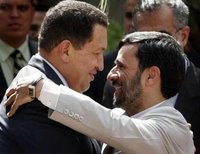

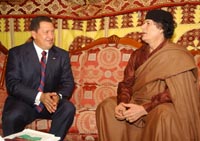
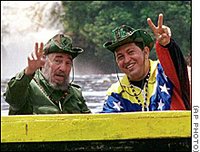
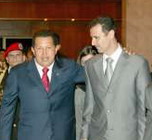
 Site feed
Site feed 